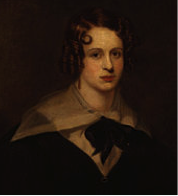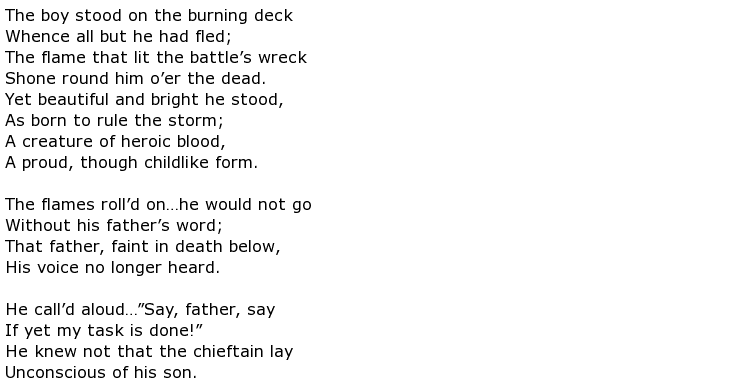 Felicia Hemans was a 19th century poet of both English and Irish descent although she also considered herself half Welsh later in life. She was a prolific poet who received criticism and praise in almost equal measures. Female poets in the early 19th century were rare and not, generally, well regarded. Felicia Hemans though attracted the attention and admiration of poets such as Percy Bysshe Shelley, William Wordsworth and Walter Savage Landor. When she died, at the early age of 41, Wordsworth and Landor composed memorial verses in her honour.
Felicia Hemans was a 19th century poet of both English and Irish descent although she also considered herself half Welsh later in life. She was a prolific poet who received criticism and praise in almost equal measures. Female poets in the early 19th century were rare and not, generally, well regarded. Felicia Hemans though attracted the attention and admiration of poets such as Percy Bysshe Shelley, William Wordsworth and Walter Savage Landor. When she died, at the early age of 41, Wordsworth and Landor composed memorial verses in her honour.
She was born on the 25th September 1793 in the city of Liverpool, which was the great gateway to England from Ireland at that time. She came from a well to do family and her grandfather was a consul to the city. The family moved to North Wales and Felicia saw her new Denbighshire home as the:

Wales became, in effect, her adoptive country and her first poetic efforts were published when she was just fourteen and received interest from Shelley. The two corresponded for a while.
A year later she wrote a long, narrative poem which was an extremely mature piece of work for a 15 year old girl. It was a plaintive cry against the Peninsular Wars that were raging between European countries and a direct attack on the tyranny of Napoleon Bonaparte. She prayed for everlasting peace and that “Albion” should prevail, this being the old name for the British Isles. Her poetry clearly demonstrated her patriotism for her country and a passionate desire for no more “useless bloodshed” and no more “waste of human life”.
At the age of nineteen she was taken away from Wales by her marriage to an army officer, who was of a much greater age than her They set up home in Daventry, Northamptonshire for at least two years but the marriage lasted for only four more years beyond that. Despite being busy having five sons Felicia continued to write a great deal of poetry, publishing such titles as:

There are two pieces of work which, perhaps, are best remembered from her collections for different reasons. In 1827 she wrote a poem called The Homes of England and this is thought to contain the first reference to the phrase “The stately homes of England” In the 20th century the famous Noel Coward wrote a song with that title and it is a phrase that is still in common use. Arguably her most famous work though was the 1826 poem Casabianca about one Louis de Casabianca who was the commander of a burning ship during the Battle of the Nile. In it there is a reference to a boy who remains on deck while the ship burns and the first line has since been used in an amusing, slightly ribald, limerick. Here are the first three verses:

From 1831 Felicia was living in Dublin but, alas, her days were numbered. She was now a popular poet in Britain and the United States, especially amongst female readers. It was said that she offered “a woman’s voice confiding a woman’s trials” while others saw a:

Felicia Dorothea Hemans died on the 16th May 1835 of a curious illness called dropsy, which is an abnormal accumulation of fluid beneath the skin and in several cavities of the body. She was 41 years old.

